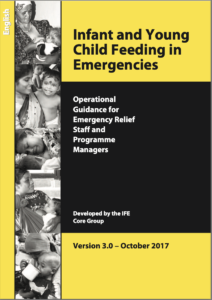
Operational Guidance on Infant Feeding in Emergencies (OG-IFE) version 3.0 (Oct 2017)
Occupied Palestinian Territory: Focus on Arabic IYCFE tools,
Why food and health should not be used as weapons of war”
IBFAN Arab world, supported by many IBFAN members, has been holding webinars to show solidarity for Gaza and draw attention to the intolerable situation facing families, mothers and babies, and highlighting the urgent need for breastfeeding and re-lactation support. IBFAN regularly makes statements at WHO and other meetings calling for the protection of mothers and children, alongside immediate ceasefire, immediate implementation of UN resolutions, embargo on weapons and the denouncement of genocide and crimes against humanity. The WPHN Congress symposium “Why food and health should not be used as weapons of war” included presentations from Ukraine, Tigray and Afghanistan and Dr Gihan Fouad, who explained the situation in Gaza. IBFAN is a member of the multi-agency Infant feeding in Emergencies Core Group, that address policy gaps in infant and young child feeding support in emergencies.
MEDIA: Emergency Appeals: getting the message right
What to avoid:
- Messages that suggest that women can’t breastfeed because of stress or malnourishment are not helpful and feed commonly held misconceptions. Mothers need support, protection, encouragement and reassurance – this is far more likely to help them maintain breastfeeding or relactate.
- Calls for donations of breastmilk substitutes and bottles and teats can do more harm than good. Bottle feeding is a huge risk in emergency situations and is unsustainable. If supplies are needed they should be “purchased, distributed and used according to strict criteria.’*
- Baby foods industry claims that they have humanitarian motives. This is all part of a CSR marketing strategy that we call “the Business of Malnutrition.’’
WHO Regional Committee for Europe: Slovenia calls for support for breastfeeding in emergencies.
IBFAN and Infant Feeding in Emergencies
IBFAN, the global network that has exposed the risks of commercial exploitation of emergencies since the early 1980s, is a founder member of the multi-agency Infant feeding in Emergencies Core Group, set up in 1999 to address policy gaps in infant and young child feeding support in emergencies
The IFE has many important resources– see also the IYCFE HUB https://iycfehub.org/ with materials and infographics.
________________________________________________-
A little bit of history:
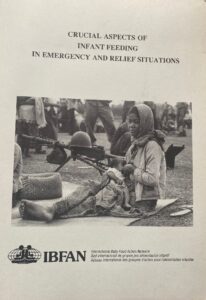
Crucial Aspects of Infant Feeding in Emergency and Relief Situations. July 1996. IBFAN, Geneva.
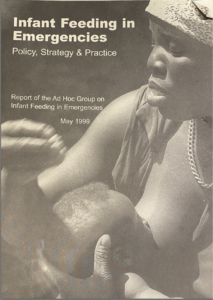
Infant Feeding in Emergencies, Policy, Strategy and Practice meeting, May 1999 Infant Feeding in Emergencies Group (IFEG)
In 1994 a TV appeal sponsored by Cow& Gate for Bosnia helped kickstart the move to bring UK aid agencies together to address IFE. The appeal shockingly ignored the risks of bottle-feeding with commentaries alongside breastfeeding mothers and babies: “How must this mother feel knowing her baby is aching with hunger?…How can this mother cope knowing she is helpless to protect her daughter from illness and infection?” followed by: “Just L20 can supply a life-saving box for Bosnia each one containing over 30 essential items to keep a baby alive and healthy.”
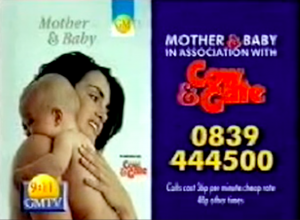
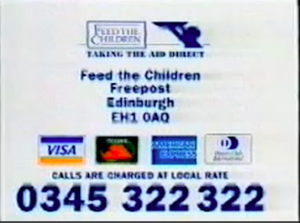
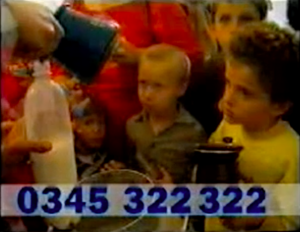 The NGO Feed the Children responded well to the critique and subsequently changed its name to Children’s Aid Direct and helped with the establishment of the Infant Feeding in Emergencies Group (IFEG).
The NGO Feed the Children responded well to the critique and subsequently changed its name to Children’s Aid Direct and helped with the establishment of the Infant Feeding in Emergencies Group (IFEG).
In October 1995 IBFAN in Geneva (GIFA) alongside the IFEG, Save the Children and Children’s Aid Direct and participants from 23 countries met in Split, Croatia(1). The meeting developed action plans to improve co-ordination between agencies and prevent commercial exploitation. Dr Aileen Robertson, of WHO Europe, used events in Bosnia and Russia to explain how “emergency situations can be public health opportunities” and stressed the importance of protecting local food production. Breastmilk, of course, is the most local food possible. The Business of Nutrition. Meanwhile the business community was promoting its own view of its role in emergencies. The Business Humanitarian Forum, with an initial budget of US$ 250,000, met for the first time in a luxury hotel in Geneva in January 1995, aiming to “strengthen the ties between the business and humanitarian communities”.Participants included top people from the world’s largest military contractors as well as Nestlé, Rio Tinto, Merck, and several UN agencies and NGOs. Media was strictly excluded “to facilitate open discussions.” (Ref: Gemini News). Soon after, the Public Relations firm Saatchi and Saatchi advised Nestlé to counter recent adverse publicity with an ‘offensive’ which advertises its links with charities. See Boycott News
In May 1999, Save the Children, Oxfam, Difid, ENN, Children’s Aid Direct and Baby Milk Action convened the Ad Hoc Infant Feeding in Emergencies, Policy, Strategy and Practice meeting. Click here for the report of that meeting.
“The purpose of the UK Infant Feeding in Emergencies Group (IFEG) was to build on existing knowledge and to formulate a coherent, appropriate and widely acceptable policy and strategy statement on infant feeding in emergencies for humanitarian agencies. IFEG also attempted to address some of the problems and knowledge gaps around this subject and to identify practical tools to assist agencies in the implementation of policy.”
This resulted many UK charities coming together to strengthen and improve their infant feeding in emergencies policies and the formation of Infant Feeding in Emergencies interagency group – hosted by the Emergencies Nutrition Network (ENN).
IBFAN is still an active member of the IFE Core Group and over the years has highlighted the importance of Conflicts of Interest safeguards and the International Code of Marketing of Breastmilk Substitutes and the World Health Assembly Resolutions.The need for monitoring and reporting of Code violations remains critical in all emergency responses.
The IFE has many important resources– see also the IYCFE HUB https://iycfehub.org/ with materials and infographics.
(1) Crucial Aspects of Infant Feeding in Emergency and Relief Situations. July 1996. IBFAN, Geneva.
(2) Ad Hoc Meeting: Infant Feeding in Emergencies, Policy, Strategy and Practice meeting, May 1999 Infant Feeding in Emergencies Group (IFEG) Click here
Here’s a link to a statement on Ukraine.
https://www.gifa.org/en/international-2/crisis-situations/

Operational Guidance on Infant Feeding in Emergencies (OG-IFE) version 3.0 (Oct 2017)
https://www.ennonline.net/sites/default/files/2024-02/ops-guidance-on-ife_v3_english.pdf
____________________________________________________
Some related Blogs
Pakistan Floods: IBFAN supports Ministry of Health’s call to protect breastfeeding
Mpox and breastmilk: for once, can we act in time? (thelancet.com) September 13, 2024 https://doi.org/10.1016/ S0140-6736(24)01881-6
Two films that stress the importance of breastfeeding in emergencies and the risks of unsolicited donations of formula. Here are the links Breastmilk is A Lifeline during Disastersand this one The Story of untargeted infant formula donations
___________________________________________________
July 2024: Devex ends partnership with Nestle following alarm by NGOs and global health experts
_____________________________________________________
Debate about fortified foods in emergencies
Join the debate about SQLNS supplements and the prevention of undernutrition
The 76th WHA in May 2023 passed a WHA Resolution on Fortification: WHA76.19. May 2023. Accelerating efforts for preventing micronutrient deficiencies and their consequences, including spina bifida and other neural tube defects, through safe and effective food fortification
IBFAN made a Statement at the WHA 76 along with Slovakia and Bangladesh, calling for safeguards:
” IBFAN welcomes WHO’s attention to nutrition. However, the resolution on fortification is concerning for many reasons. Although the primary role of diverse diets is acknowledged, the Resolution implies that it is almost inevitable that fortification and supplements will be needed. There is no mention of cultural acceptability or that reliance on fortified supplements can undermine confidence in bio-diverse, minimally processed REAL foods. We call once again for WHO to urgently develop a global definition for the Ultra Processed products that are doing so much harm to human health and the environment. The Resolution should not go forward without a new operative Paragraph 9, urging Member Sates to “adopt legally binding safeguards to protect policy setting and implementation from commercial influence and exploitation”.
MEDIA: Emergency Appeals: getting the message right
In 2017, we criticised an appeal by the Disasters Emergency Committee DEC – Bisharo has no milk. After being alerted, the DEC ran a second, better appeal – Help make this Mother’s Day and has since improved its messaging about breastfeeding.
Preventing and managing inappropriate donations
2017 revision of the original 1999 Operational Guidance on Infant and Young Child Feeding in Emergencies outlines evidence-based actions to safeguard the health of infants and young children in emergencies (also in Arabic).
- Donations of baby feeding products can undermine efforts to protect breastfeeding – a practice that is resilient and provides food, care, immune support and protection from the worst of emergency conditions.
- There are common misconceptions about breastfeeding and stress. Although stress can temporarily interfere with the flow of breast milk in some women, it is not likely to inhibit breastmilk production, provided mothers and infants remain together and are supported to initiate and continue frequent breastfeeding.
- The cost of shipping large heavy tins of formula wastes resources. Giving cash to trusted organisations who can distribute the appropriate formula on the spot is safer.
- Donated products may not be the right stage or type, instructions may not be adequate or in the correct language and labels may carry false claims.
- Families hiding in shelters or on the move often don’t have any way to boil water to prepare formula safely. During emergencies, formula can make some babies ill and should only be used when needed.
- Babies are at great risk of water-related diseases, with diarrhoeal disease the second biggest killer of under-fives.
Babies have specific nutritional needs and are born with an undeveloped immune system. For infants who are breastfed, breastmilk provides both food and immune support, which protects them from the worst of emergency conditions. However, the situation is very different for babies who are not breastfed. In an emergency, food supplies are disrupted, there may be no clean water with which to make up breastmilk substitutes or to clean feeding implements. Health care systems are invariably stretched past breaking point. This means that babies who are not breastfed are vulnerable to infection and to developing diarrhoea. Babies with diarrhoea easily become malnourished and dehydrated and so are at real risk of death. So whenever there is an emergency, it is extremely important that babies who are already being breastfed continue to be and that babies who are not breastfed re-start breastfeeding or, if this is not possible, are given infant formula in the safest possible way.
Turkish earthquake story.
https://people.com/human-interest/turkey-syria-earthquake-woman-breastfed-newborn-trapped-under-rubble/
February 2023: Turkey-Syria Earthquake: Mom Breastfed Baby While Buried in Rubble and Says Son’s Strength Helped Her Survive
“If my baby hadn’t been strong enough to handle this, I wouldn’t have been either,” Necla Camuz, 33, said of being trapped for nearly four days with her son under debris
Despite the odds, a mother and her newborn child survived on little more than hope and breast milk for nearly four days while trapped under debris following the devastating earthquake that rocked Turkey and Syria last week. The woman, Necla Camuz, and her 10-day-old baby, Yagiz Ulas, were rescued from the rubble of their former home more than 90 hours after the earthquake struck Feb. 6, according to Turkish state media. Yagiz and his mom, 33, were inside their home in Turkey’s Hatay province at the time, as were Camuz’s husband of six years, Irfan, and her 3-year-old son, Yigit Kerim, according to the BBC Camuz was buried holding Yagiz, who was lying on her chest at the time of the quake. The two remained stuck for days underneath the five-story building, located in the town of Samandah.
The mom told the BBC she “was terrified” that no one would come to their rescue. Camuz said she did not believe she would survive, but relied on Yagiz for hope. She now credits her newborn for saving her life. “I think if my baby hadn’t been strong enough to handle this, I wouldn’t have been either,” she explains.
IFE_policy_strategy_and_practice Report of the Ad Hoc Group on Infant feeding in Emergencies. May 1999
Briefing on Protecting infants in emergencies: Information for the Media
https://worldnutritionjournal.org/index.php/wn/article/view/584/539

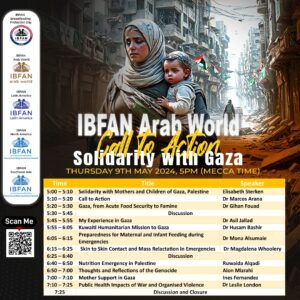


Pingback: Ukraine emergency. How to help and why formula donations can be a risk to child health. | Baby Milk Action